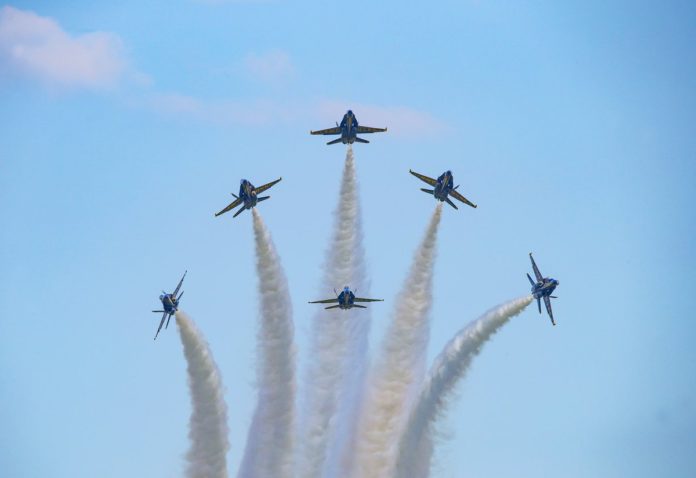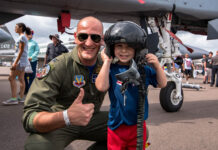At EAA AirVenture this summer, I had the pleasure to attend the Blue Angels forum at the Theater in the Woods. It was the first time that the team had been to Oshkosh, so the over-capacity crowd– the majority of whom were homebuilt operators—had many questions for the most well-known military demonstration team in the world.
Right out of the gate, a young boy asked one of the most difficult questions: “How many accidents have you had?” I could tell that the rest of the officers on stage were more than willing to give that question to the team leader, Commander Ryan Bernacchi. The Boss used that potentially awkward moment as an opportunity to talk about the deeply ingrained philosophy on the team that, no matter how good, every flight can be better. He discussed the practice of the team to list each mistake after every flight in front of the entire team and then say, “I’ll fix it all, and I’m glad to be here.” Unpacking this mantra provides some insight into the culture of the Blue Angels, but it also allows us all to consider shifting our own paradigm.
First, each member of the team identifies mistakes in front of the rest of the team. There’s a certain power to this brand of self-reflection. When we make a habit of critiquing ourselves, it becomes easier to identify smaller and smaller errors that lead to larger problems. At the risk of confessing some of my own my mistakes, I can tell you that many car insurance companies offer apps that track your daily driving habits for exactly this reason. When you have the ability to see the little mistakes you make every day while driving your car, you become less likely to be involved in a major accident. When the Blue Angels admit errors in front of the entire team, this effect is amplified. Each team member knows that their own mistakes have been laid bare in front of the whole team. So, they become more aware of that error when they fly next and less likely to repeat it. While the rest of the air show community may not have an entire team around them, we all have peers and mentors that are invested in our development that would happily listen to and offer advice on our self-assessments.
Second, the phrase “I’ll fix it all” is quite simple and quite powerful. Those words reflect the knowledge that we own the mistakes that we make and the subsequent corrections. This is not just good practice for F-18 pilots, but for all of us. When we err, it is inappropriate to expect others to fix those mistakes. When we take the lead on fixing our mistakes, it gives a degree of confidence to those around us that we can be relied upon to put pride on the shelf for the betterment of the group and the event. I’ve made my fair share of mistakes, and – as Boss Bernacchi spoke on the stage at AirVenture – it occurred to me how empowering and productive it is to own those mistakes…completely. “I acknowledge that I made a mistake and I’m confident enough in my abilities to know that I can do it better next time.” No excuses. Nothing conditional about if and how I will improve. “I’ll fix it all.” Period.
Finally, “I’m glad to be here.” Again, a few simple words that speak volumes. It is a declaration for each member that, despite any mistakes, despite the high expectations, and despite the rigorous debrief, they are still happy to be flying with the team. The difference between an individual happy in their line of work versus someone that is only going through the motions is palpable. When we have a passion for what we do, correcting mistakes isn’t just an obligation; it’s part – an important part — of why we’re doing what we do.
Is it simplistic or naive to think that we can bring this same kind of accountability and positive affirmation to what we do in our own corner of the air show business? I don’t think so. Performers and air bosses, event organizers and support service providers. And ICAS staff, too. As the current air show season winds down, we should all have the courage to assess our air show season, identify mistakes to mentors and peers, and ask ourselves if we are enjoying it.
As for me, there’s not space enough here to enumerate the mistakes that I’ve made this year, but I’m committed to fixing them and remain very glad to be here.








